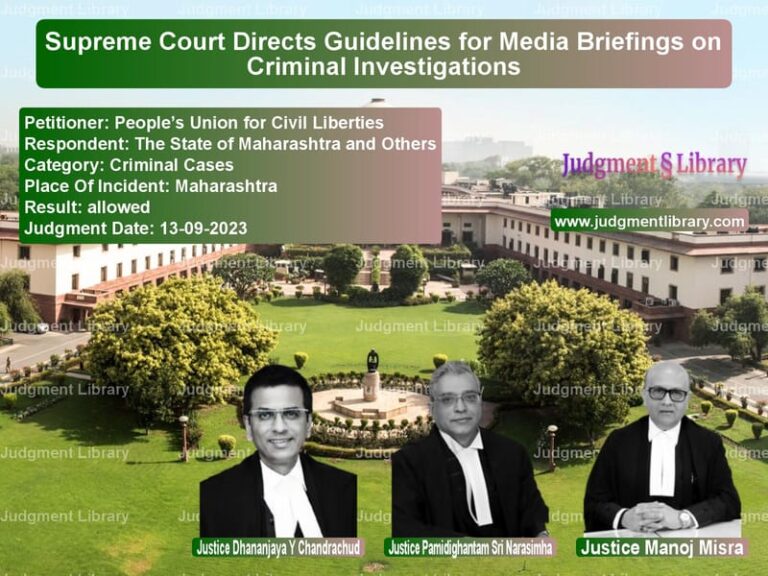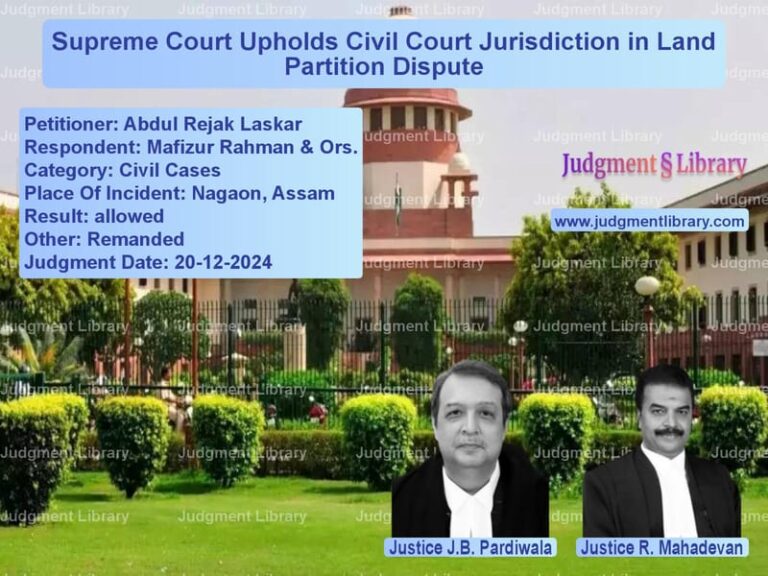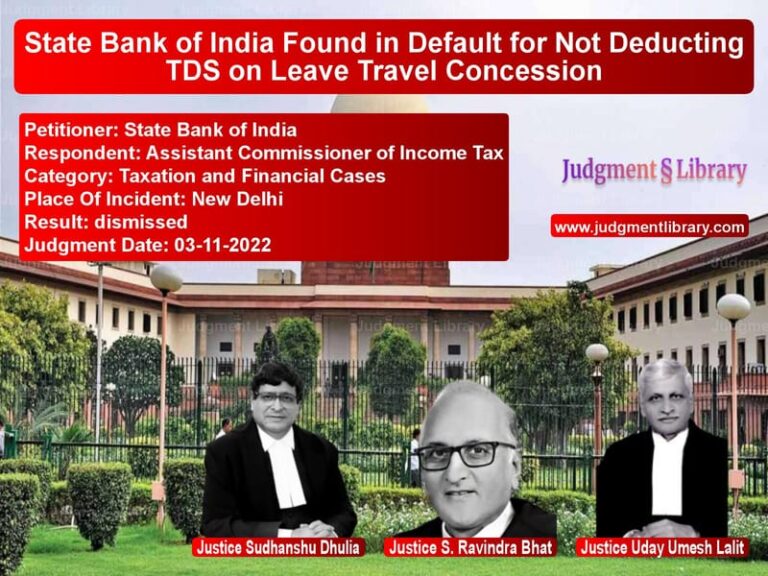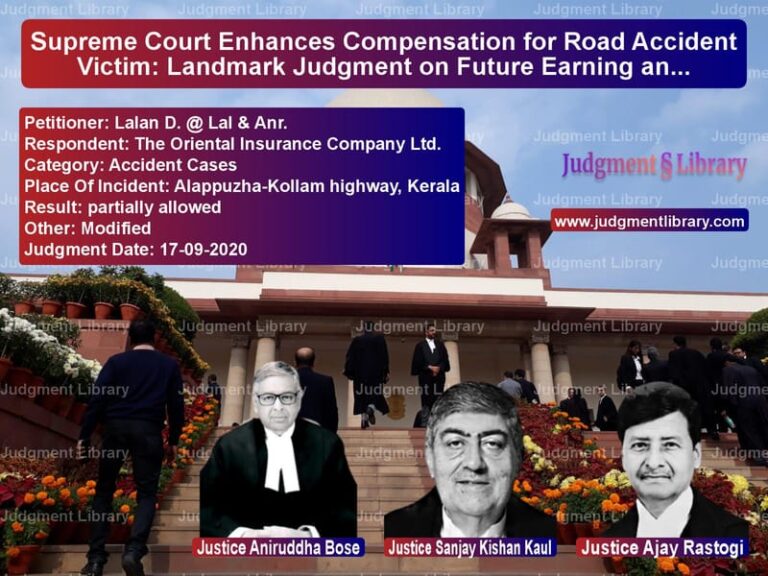Supreme Court Grants Promotion and Pay Benefits to Doordarshan Employees
The Supreme Court, in its judgment dated September 26, 2018, in the case of Union of India & Ors. vs. E Krishna Rao & Ors., ruled in favor of Doordarshan employees seeking promotion and pay benefits. The Court upheld the Central Administrative Tribunal’s (CAT) decision, which directed the government to provide all service benefits to the respondents and consider their cases for promotion under the Indian Broadcasting (Programme) Service Rules, 1990 (IBPS Rules).
Background of the Case
The dispute arose when E Krishna Rao and other employees, who were initially engaged as TV News Correspondents and TV Assistant News Correspondents on contract, were later declared government servants but were denied benefits under the IBPS Rules. The key issues in the case were:
- Whether TV News Correspondents and TV Assistant News Correspondents should be considered for promotion under the IBPS Rules.
- Whether they were entitled to the same benefits as other departmental candidates.
- Whether they should receive pay scales and retiral benefits in line with equivalent posts.
Arguments by the Petitioners (Union of India)
The Union of India argued:
- The IBPS Rules did not specifically include the posts of TV News Correspondent and TV Assistant News Correspondent.
- The respondents could not be considered departmental candidates under Rule 2(c) of the IBPS Rules.
- The Central Administrative Tribunal (CAT) had exceeded its jurisdiction by directing the government to grant promotions and pay benefits.
- Since the respondents had been engaged on contract, they should not be treated as regular government employees.
Arguments by the Respondents (E Krishna Rao & Ors.)
The respondents contended:
- They were declared government servants by a memorandum dated March 31, 1992, and therefore, should be entitled to the same benefits as other government employees.
- Their posts were sanctioned and deemed to be included in the IBPS service.
- They had been denied promotions for over 12 years, causing financial and professional hardship.
- The CAT’s decision was justified as it upheld equality in pay scales and benefits for similarly placed employees.
Supreme Court’s Observations
The Supreme Court examined the IBPS Rules, the status of the employees, and the Tribunal’s decision before reaching its conclusions.
1. Recognition as Departmental Candidates
The Court ruled that the respondents fit the definition of departmental candidates under Rule 2(c) of the IBPS Rules, which includes officers holding posts on a regular basis in the Programme Cadre of All India Radio and Doordarshan.
“The High Court correctly interpreted Rule 2(c), holding that the respondents qualify as departmental candidates.”
2. Automatic Inclusion in the IBPS Service
The Court held that, under Rule 6 and Note 3 of Schedule I of the IBPS Rules, all posts sanctioned in All India Radio and Doordarshan after January 1, 1985, were deemed to be included in the service.
“On the date of the commencement of the Rules, the respondents’ pay scales matched those of IBPS officers, confirming their inclusion in the service.”
3. Denial of Promotions was Unjust
The Court found that denying promotions to the respondents for over a decade violated principles of fairness.
“Once they were declared government servants, it would be unfair and inequitable to deny them all the benefits applicable to posts in the equivalent pay scale.”
4. Protection of Existing Promotions
The Court clarified that promotions already granted to other employees would not be disturbed, and individual cases for promotion would be considered based on available vacancies.
“Promotions already effected shall not be affected; individual cases will be considered against available vacancies.”
Final Judgment
The Supreme Court ruled:
- The appeals were dismissed, affirming the CAT and High Court decisions.
- The respondents were entitled to all service benefits under the IBPS Rules.
- The government must consider their cases for promotion.
- Retired employees should receive notional pay fixation for pensionary benefits.
Implications of the Judgment
This ruling has significant implications for government employees and service matters.
1. Strengthening Employees’ Rights
The judgment reinforces that employees declared as government servants must receive all benefits.
2. Ensuring Fair Promotions
It establishes that employees cannot be denied promotions due to administrative delays.
3. Protection of Retiral Benefits
The ruling ensures that retired employees receive appropriate pension and pay fixation.
4. Clarity on Service Rules
The decision clarifies that sanctioned posts in Doordarshan and AIR must be included in IBPS service.
Conclusion
The Supreme Court’s decision in Union of India & Ors. vs. E Krishna Rao & Ors. is a landmark ruling that upholds service rights and fair promotions for government employees. The judgment ensures that Doordarshan employees receive due benefits and prevents unjust exclusion from service rules. By dismissing the appeals, the Court has affirmed equal treatment and fairness in public sector employment.
Petitioner Name: Union of India & Ors..Respondent Name: E Krishna Rao & Ors..Judgment By: Justice Dipak Misra, Justice Dhananjaya Y Chandrachud, Justice Indira Banerjee.Place Of Incident: Andhra Pradesh.Judgment Date: 26-09-2018.
Don’t miss out on the full details! Download the complete judgment in PDF format below and gain valuable insights instantly!
Download Judgment: Union of India & Ors vs E Krishna Rao & Ors. Supreme Court of India Judgment Dated 26-09-2018.pdf
Direct Downlaod Judgment: Direct downlaod this Judgment
See all petitions in Promotion Cases
See all petitions in Public Sector Employees
See all petitions in Recruitment Policies
See all petitions in Judgment by Dipak Misra
See all petitions in Judgment by Dhananjaya Y Chandrachud
See all petitions in Judgment by Indira Banerjee
See all petitions in dismissed
See all petitions in supreme court of India judgments September 2018
See all petitions in 2018 judgments
See all posts in Service Matters Category
See all allowed petitions in Service Matters Category
See all Dismissed petitions in Service Matters Category
See all partially allowed petitions in Service Matters Category







